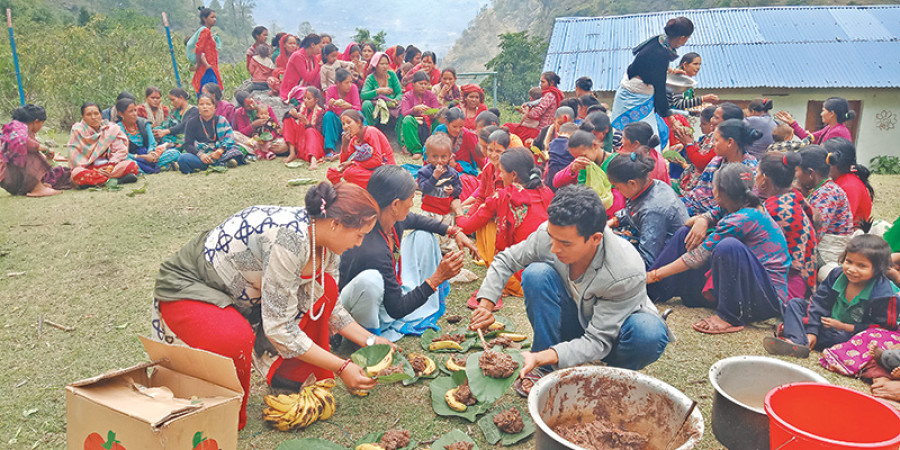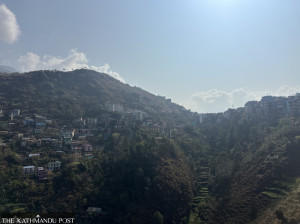Karnali Province
Malnutrition in children serious health challenge in several Karnali districts
Poverty, food shortage and lack of awareness behind existing malnutrition crisis, say experts.
Tularam Pandey & Raj Bahadur Shahi
A pair of twin sisters, aged 18 months, of Khandachakra Municipality Ward No. 5 in Kalikot was rushed to nearby Daha Health Post last week after they suffered from diarrhoea. In the course of treatment, both of them were found suffering from severe malnutrition and were referred to the district hospital.
Another 10-month-old girl from Ward No. 2 of the same municipality has also been receiving treatment for severe malnutrition at the district hospital for the past three days. Eight such malnourished children are undergoing treatment at the district hospital at present. According to the data available at the hospital, 10 other children who suffered from malnutrition returned home after receiving treatment for malnutrition since the beginning of the current fiscal year on July 16.
“The children are generally taken to the hospital when they are already in a critical condition. So it takes time to complete their treatment,” said Dr Sandip Chaudhary at the district hospital. According to him, malnutrition is still a serious healh challenge in Kalikot due to prevailing gender discrimination, lack of awareness regarding nutrition and workload on women.
According to the District Health Office in Kalikot, a total of 168 children have been diagnosed with severe malnutrition in the district since mid-July.
“Sixty-seven of them have been treated while the remaining others are receiving treatment in various malnutrition treatment centres,” said Katak Bahadur Mahat, the information officer at the health office. According to him, malnutrition treatment centres have been set up in 11 different health facilities in the district to provide treatment to malnourished children. The children are kept under the direct observation of health workers for two months before they are sent home.
Malnourishment is also prevalent in Mugu, another remote district of Karnali Province. According to the District Health Office in Mugu, as many as 108 children were found suffering from severe malnutrition in the district in the past six months.
Parashuram Nepali, the information officer at the health office, said that most of the malnourished children in the district were from Chhanyanathrara Municipality and Soru Rural Municipality. He opined that poverty, food shortage and lack of public health awareness are the main reasons behind the prevalence of malnutrition in the district.
“The habit of consuming junk food instead of local food causes malnutrition. The problem can be solved largely if the consumption of local produce increases,” said Nepali.
The World Food Programme has been launching a fortified flour distribution programme through Sappros Nepal in Mugu since 2013 to tackle malnutrition. It provides three kg flour—fortified with all necessary micronutrients—to pregnant women, new mothers and children aged below five years every month to address chronic malnutrition problems in the district.
“Around 5,000 children are provided the fortified flour each year in Mugu. But the situation has not improved much,” said Nepali.
Malnutrition is a serious health crisis in Karnali and other western hill districts in the country. The Multiple Indicator Survey-2019 showed that that prevalence of wasting among children in Karnali Province was 17.6, the highest in the country followed by Province 1 (14.3 percent), Sudurpaschim Province (14.1 percent), Province 2 (13.9 percent ), Lumbini Province (13.7 percent), Gandaki Province (8 percent) and Bagmati Province (4.7 percent).
Malnutrition has been a long-standing problem in Karnali mainly due to food scarcity and shortage of nutritious foods. According to the Provincial Health Directorate in Surkhet, the majority of people in Karnali are deprived of nutritious foods.
“Many people eat almost the same food every day. The local residents have to struggle to manage two square meals a day. Children are the most affected by malnutrition,” said Mankumari Gurung, the senior nursing officer at the directorate. According to her, only 29.5 percent of Karnali residents consume a variety of food.
Some local units in Karnali have launched campaigns to promote local food consumption and consumption of a variety of nutritious food. Khandachakra Municipality in Kalikot has launched a local food promotion campaign in all 11 wards. According to Rabindra Sejuwal, the health unit chief of the local body, the municipality has allocated Rs 4.7 million for the nutrition programme.
“The municipality has been conducting an awareness programme to end malnutrition and provide nutritious foods to pregnant women, nursing mothers and children,” he added.
(Chandani Kathayat contributed reporting from Birendranagar in Surkhet)




 14.24°C Kathmandu
14.24°C Kathmandu
.jpg)













